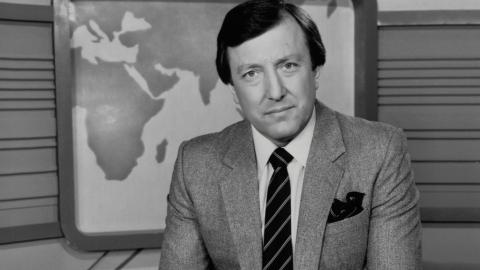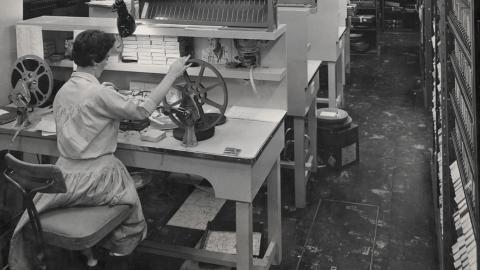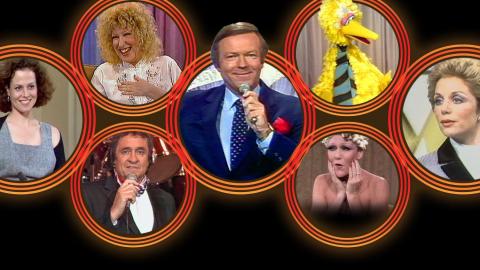

Hypothetical
Geoffrey Robertson's Hypothetical on the Sunday program
This is the second article in a 2-part series in recognition of the Sunday current affairs program's 40th anniversary.
In this article, senior video preservation specialist Richard Vorobieff takes a close look at the innovative Hypothetical segment of the show.
'An elaborate game'
Hypothetical is moderated by barrister Geoffrey Robertson AO QC. In each episode Robertson introduces a hypothetical scenario and leads 15 panellists from business, the public service, the law and politics to confront a series of complex problems through role play.
In this clip, Sunday host Jim Waley introduces the first ever Hypothetical segment on Australian television on 11 March 1984. Entitled 'Corporate Country: Pinstripes, Power and Politics', he calls it 'an elaborate game':
Excerpt from Sunday, broadcast on 11 March 1984. Courtesy Nine Network. NFSA title: 1461718
'We can't be in the business of being merchants of death'
This clip from Hypothetical takes a dramatic turn when Robertson role plays a life-and-death scenario with the panel. Each panellist plays a fictitious role but they obviously draw on their skill sets and experience to manage the dramatic scenario. It is fascinating to see how they react.
Panellists in this segment include Bob Ansett – then-managing director of Budget Rent-a-car, business executive Jeremy Wright and labour leader and politician John Ducker AO:
Excerpt from Sunday, broadcast on 11 March 1984. Courtesy Nine Network. NFSA title: 1461718
'Compulsive bottom pincher'
This particular scene highlights attitudes of the time towards sexual harassment and misconduct. There is a lot of awkward laughter from both the panel and the studio audience and the scenario offers multiple ways for the perpetrator to be excused or laughed off.
Of the 15 panellists only 2 are women and there are no people of colour, which also says a lot about representation in the Australian media in the mid-1980s:
Excerpt from Sunday, broadcast on 11 March 1984. Courtesy Nine Network. NFSA title: 1461718
Unfair dismissal?
This exchange features Richard Walsh - chief executive of Angus & Robertson, Carmel Niland - president of the NSW anti-discrimination board and business person Tim Harricks.
It is instructive of attitudes at the time that the hypothetical embezzling serial harrasser is let off the hook by his peers not holding him to account:
Excerpt from Sunday, broadcast on 11 March 1984. Courtesy Nine Network. NFSA title: 1461718
Recalling a potentially faulty helicopter
Robertson, clearly relishing his role as interviewer, prosecutor and judge-like figure, plays gleeful puppet-master in this exchange featuring business people Jeremy Wright and Jacqueline Huie.
It is interesting to note that Huie (one of only 2 women on the panel of 15 leaders) is smoking here, which was unusual enough to see on television in the mid-1980s but is even harder to imagine today:
Excerpt from Sunday, broadcast on 11 March 1984. Courtesy Nine Network. NFSA title: 1461718
Hypothetical Controversy
Three Hypotheticals were broadcast in 1984 – Corporate Country, The Hippocratic Hypothetical and A Foreign Affair.
Another Hypothetical was taped that year, but didn’t air. The scenario centred around a fictional media proprietor called ‘Kerry Murfax’ and a secret recording of the same magnate involved in drug trafficking. One of the panellists, then 60 Minutes producer Gerald Stone, said in his memoir Compulsive Viewing: The Inside Story of Packer’s Nine Network: ‘my own feeling is that the defamatory nature of the scenario would have justified it being scrapped on legal grounds alone, regardless of who owned the station’.
Moving to the ABC
Robertson left the Sunday program in 1985 to present Geoffrey Robertson's Hypotheticals on the ABC, which ran for 10 years. However he did return to the program in April 2006 to present a Sunday Hypothetical entitled 'Defining Australia'. In it he asked, ‘What's it like to reach maturity in Australia in 2006? Let's ask the graduating class of the Paul Keating Memorial High School, in Minestrone, a southern suburb of Sydney’.
This series represents just a small sample of Sunday’s inventive breadth and depth from 1981 to 2008. As Jim Waley used to sign off, ‘that’s Sunday for this Sunday’.
Read part one of Richard Vorobieff's Sunday program tribute.
The National Film and Sound Archive of Australia acknowledges Australia’s Aboriginal and Torres Strait Islander peoples as the Traditional Custodians of the land on which we work and live and gives respect to their Elders both past and present.


